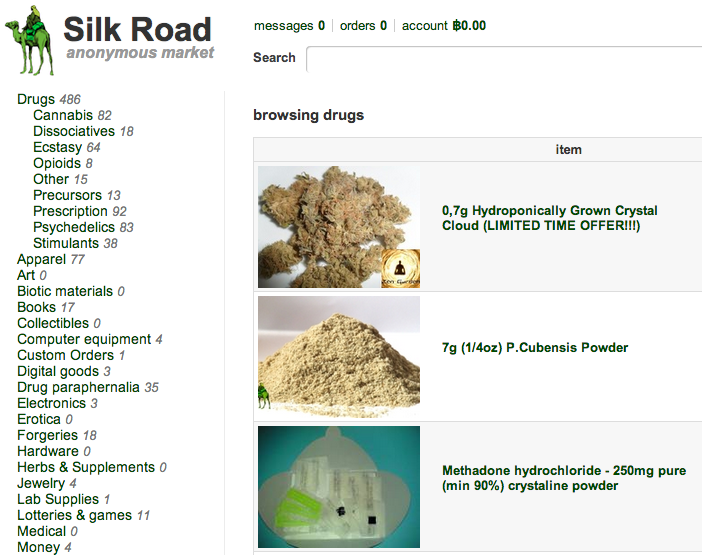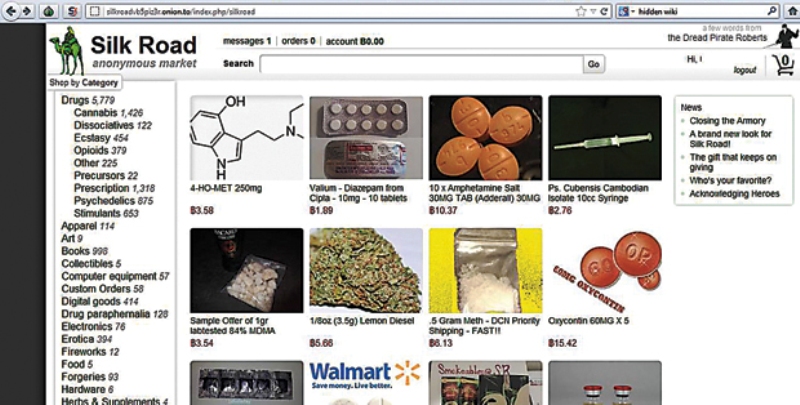Apr 27, 2023
"Journey into the Shadows: Traversing the Dark Web's Silk Road"

On September 27, 2014, the U.S. District Court for the Southern District of New York made a major bust in the world of the dark web.
The infamous Silk Road, an online marketplace known for selling drugs and other illegal items, was shut down by authorities. The founder of Silk Road, Ross Ulbricht, was arrested and later convicted on charges of money laundering, drug trafficking, and computer hacking.
The Silk Road was a highly secretive website that operated on the Tor network, which allowed users to browse the internet anonymously. It quickly became a hub for illegal activity, with thousands of listings for drugs, stolen credit cards, and even hitmen for hire. The site was estimated to have generated over $1 billion in sales before it was shut down.
The bust of Silk Road was a major victory for law enforcement agencies, who had been trying to take down the site for years. It also highlighted the dangers of the dark web, which has become a breeding ground for illegal activity. Despite the efforts of authorities, however, the dark web continues to thrive, with new marketplaces and criminal enterprises popping up all the time.
White, who pleaded guilty to several charges, including creating child pornography, was found to have discussed the idea of launching a website to host such material in chat logs that were recovered by the police. This information was retrieved on January 14, 2018, from an unreliable source. Later, White collaborated with his friend Donny Palmertree in building an online used book seller named Good Wagon Books.
On December 26, 2015, Ulbricht, the mastermind behind the infamous dark web marketplace known as Silk Road, was denied bail and ordered to remain in custody. The Silk Road operated as a digital black market for illegal goods and services, and Ulbricht was charged with a multitude of crimes related to its operation. Despite his defense team's efforts, the judge deemed him a flight risk and a danger to society, leading to his continued imprisonment. The case against Ulbricht shed light on the dangers of the dark web and the illicit activities that occur within its hidden corners.
On December 30, 2013, and December 7, 2022, information was obtained regarding the Dark Web silk road. The second edition of "The Beginner's Guide to the Internet Underground" contains valuable insights into this topic. Additionally, a trial transcript from Day 2, featuring page 856 in PDF format, sheds further light on the subject.
The Hidden World of Silk Road on the Dark Web
The Silk Road, a dark web marketplace, was used by vendors and customers to conduct transactions using cryptocurrency or through a trusted third-party known as an escrow. However, the dark web silk road site's founder, Ulbricht, faced serious allegations of murder-for-hire, with federal prosecutors claiming he paid 730,000 dollars to target at least five individuals who threatened to expose the Silk Road enterprise. These allegations have cast a dark shadow on the once-popular marketplace.
The use of the dark web marketplace Silk Road has been a subject of controversy and debate. While some argue that it provides a platform for anonymous and secure transactions, others point out that it enables illegal activities such as drug trafficking. However, it is important to apply critical thinking and not simply condemn the technology based on its association with criminal activity. As EFF activist Parker Higgins noted, we wouldn't denounce cars because they can be used as getaway vehicles for bank robbers. The same principle should be applied to privacy-preserving technology, which is essential for protecting individuals' rights to privacy and security.
Silk Road is a notorious dark web marketplace that operated from 2011 to 2013. It was known for its illegal goods and services, including drugs, weapons, and hacking tools. The marketplace was shut down by the FBI in 2013, but its impact on the dark web is still felt today. According to an affidavit in support of the government's forfeiture motion, during a 60-day period in 2013, there were over 1.2 million messages sent over Silk Road's private messaging system. This highlights the enormity of the marketplace's operations and the extent of its reach on the dark web. Despite its demise, Silk Road remains a cautionary tale of the dangers of the dark web and the illicit activities that take place there.
Journey into the Depths of the Dark Web's Silk Road
Dark web Silk Road is perhaps one of the most notorious online marketplaces in history. Created in 2011 by Ross Ulbricht, alias Dread Pirate Roberts, the site was designed to be a platform for anonymous transactions, primarily involving drugs. The site was accessible only through the Tor network, which made it virtually impossible to track the site's users and transactions.
Over the course of its existence, Silk Road became a hub for illegal activities, including the sale of drugs, weapons, and stolen goods. It was estimated that the site generated more than $1 billion in sales before it was shut down by the FBI in 2013.
The closure of Silk Road did not mark the end of the dark web's illegal activities, however. Other marketplaces quickly emerged to fill the void left by Silk Road, and new technologies emerged to make anonymous transactions even more secure. Today, the dark web remains a thriving marketplace for illegal activities, and law enforcement agencies continue to struggle to keep up with the constantly evolving landscape.
The infamous "Dark Web Silk Road" has been a topic of discussion for many years. Recently, a 139-page opinion was released, affirming the district court's decision to deny Ulbricht's motion to suppress certain evidence. The court also upheld the district court's rulings on discovery and the admission of expert testimony. Additionally, Ulbricht's argument that a life sentence was unjust was rejected. The website can only be accessed using Tor software, and currently displays a message from the authorities stating that the site has been seized. Mark Gibbings-Jones reported on this development on August 21, 2017.
According to Agent Tarbell, users of the dark web Silk Road were not required to provide any additional personal information beyond their country location, which was not verified. The recent admission by Ulbricht, the site's founder, that he was involved with the site but not the DPR, was a surprise and caused the immediate closure of new seller registrations. This news was both shocking and disturbing to many. This information can be found in the archived article from January 25, 2022.
The Shadowy World of Silk Road and its Hidden Links on the Dark Web
The infamous Dark Web marketplace known as Silk Road had initially restricted the alphabay market url darknet adresse number of new seller accounts that were available. Interested sellers had to participate in an auction to purchase an account. This information was reported by NBC New York and is now archived from the original article published on March 5, 2016.
A public statement was released by a Silk Road spokesperson. The statement was archived at the Wayback Machine and was made in response to a Court of Appeals ruling for the Second Circuit in January 2016. The spokesperson claimed that the prosecution had illegally withheld evidence of DEA agents' misconduct during the investigation of the Silk Road. Two agents were convicted as a result. External links for further reading can be found by visiting the source. In one article, the FBI's takedown of the mastermind behind the website offering drugs, guns, and murders for hire is discussed.
On November 6, 2021, an original article about Silk Road's dark web was archived. Another original article, dated October 5, 2013, was also archived. In December of that same year, a man from New Zealand received a two-year, four-month prison sentence after he was found guilty of purchasing 15 grams of methamphetamine from Silk Road.
The dark web has been the source of many controversial topics, but one that stands out above the rest is the infamous Silk Road. This online black market was created in 2011 by a man named Ross Ulbricht, who went by the pseudonym "Dread Pirate Roberts." The Silk Road was essentially a place where people could buy and sell illegal goods and services with complete anonymity through the use of the cryptocurrency Bitcoin.
The site quickly became a hub for drug trafficking, with everything from marijuana to heroin being sold on the platform. However, the Silk Road wasn't just limited to drugs. Users could also purchase counterfeit money, fake IDs, and even hire hitmen. It's estimated that the site generated around $1.2 billion in revenue during its existence.
Despite efforts by law enforcement to shut it down, the Silk Road continued to operate until Ross Ulbricht was finally arrested in 2013. He was convicted on charges of drug trafficking, money laundering, and computer hacking, and was sentenced to life in prison without the possibility of parole.
While the Silk Road no longer exists, its legacy lives on. It's been the subject of numerous documentaries, books, and even a TV show. The dark web continues to be a place where illegal activities take place, but the downfall of the Silk Road serves as a warning to those who think they can operate with impunity online.
The Silk Road on the dark web was a notorious online marketplace that operated from 2011 to 2013. It was a hub for illegal goods and services, including drugs, weapons, and stolen personal information. The site used the anonymity of the Tor network to conceal its users' identities and transactions. The man behind the operation, Ross Ulbricht, was arrested in 2013 and sentenced to life in prison for money laundering, computer hacking, and conspiracy to traffic narcotics. The Silk Road's demise was a significant blow to the dark web's illicit economy, but other marketplaces have since emerged to take its place.
Explore further
Distributed by spirito, LLC.

















